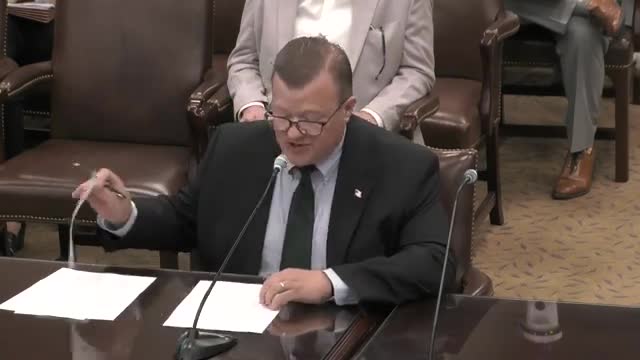Energy Policy Faces Backlash Over Environmental and Human Rights Concerns
June 24, 2024 | Environmental Resources & Energy, House of Representatives, Legislative, Pennsylvania

This article was created by AI summarizing key points discussed. AI makes mistakes, so for full details and context, please refer to the video of the full meeting. Please report any errors so we can fix them. Report an error »

In a recent government meeting, significant concerns were raised regarding the environmental and economic implications of expanding renewable energy initiatives in Pennsylvania. The discussions centered around a proposed state mandate requiring that 35% of all electricity be generated from solar panels, which critics argue could lead to extensive land use and environmental degradation.
One speaker highlighted that achieving this mandate would necessitate the consumption of nearly 1,600 square miles of land, equivalent to clear-cutting Chester, Montgomery, and Lehigh Counties combined. The potential impact on wildlife habitats, water runoff, and soil erosion was emphasized, alongside the need for effective remediation plans to mitigate these issues.
Concerns were also voiced about the sustainability of battery technology required for energy storage, with skepticism regarding the timeline for affordable solutions to support renewable energy's intermittent nature. The speaker pointed out that the U.S. lacks sufficient refining capacity for critical minerals needed for solar panels and batteries, raising alarms about energy security and dependence on foreign supply chains, particularly from China.
Human rights issues were also brought to the forefront, with references to forced labor in the production of materials for solar technology, particularly in regions like Xinjiang, China, and the Democratic Republic of the Congo. The speaker argued that the supply chains for solar panels and batteries are tainted by human rights abuses, calling for ethical considerations in energy policy.
Additionally, the meeting addressed the future disposal of solar panels and wind turbine blades, predicting a significant accumulation of waste that poses environmental risks due to toxic materials. The lack of viable recycling options for these products was noted, with projections estimating millions of tons of waste by mid-century.
The economic implications of the proposed energy policies were also a focal point, with estimates suggesting that the cost burden on Pennsylvania consumers could reach $6 billion over five years if the current bill is fully implemented. The speaker concluded with a strong opposition to any expansion of the alternative energy portfolio standards, citing the potential for detrimental effects on both the economy and consumers.
The meeting underscored the complexities and challenges associated with transitioning to renewable energy, highlighting the need for careful consideration of environmental, economic, and ethical factors in policy-making.
One speaker highlighted that achieving this mandate would necessitate the consumption of nearly 1,600 square miles of land, equivalent to clear-cutting Chester, Montgomery, and Lehigh Counties combined. The potential impact on wildlife habitats, water runoff, and soil erosion was emphasized, alongside the need for effective remediation plans to mitigate these issues.
Concerns were also voiced about the sustainability of battery technology required for energy storage, with skepticism regarding the timeline for affordable solutions to support renewable energy's intermittent nature. The speaker pointed out that the U.S. lacks sufficient refining capacity for critical minerals needed for solar panels and batteries, raising alarms about energy security and dependence on foreign supply chains, particularly from China.
Human rights issues were also brought to the forefront, with references to forced labor in the production of materials for solar technology, particularly in regions like Xinjiang, China, and the Democratic Republic of the Congo. The speaker argued that the supply chains for solar panels and batteries are tainted by human rights abuses, calling for ethical considerations in energy policy.
Additionally, the meeting addressed the future disposal of solar panels and wind turbine blades, predicting a significant accumulation of waste that poses environmental risks due to toxic materials. The lack of viable recycling options for these products was noted, with projections estimating millions of tons of waste by mid-century.
The economic implications of the proposed energy policies were also a focal point, with estimates suggesting that the cost burden on Pennsylvania consumers could reach $6 billion over five years if the current bill is fully implemented. The speaker concluded with a strong opposition to any expansion of the alternative energy portfolio standards, citing the potential for detrimental effects on both the economy and consumers.
The meeting underscored the complexities and challenges associated with transitioning to renewable energy, highlighting the need for careful consideration of environmental, economic, and ethical factors in policy-making.
View full meeting
This article is based on a recent meeting—watch the full video and explore the complete transcript for deeper insights into the discussion.
View full meeting